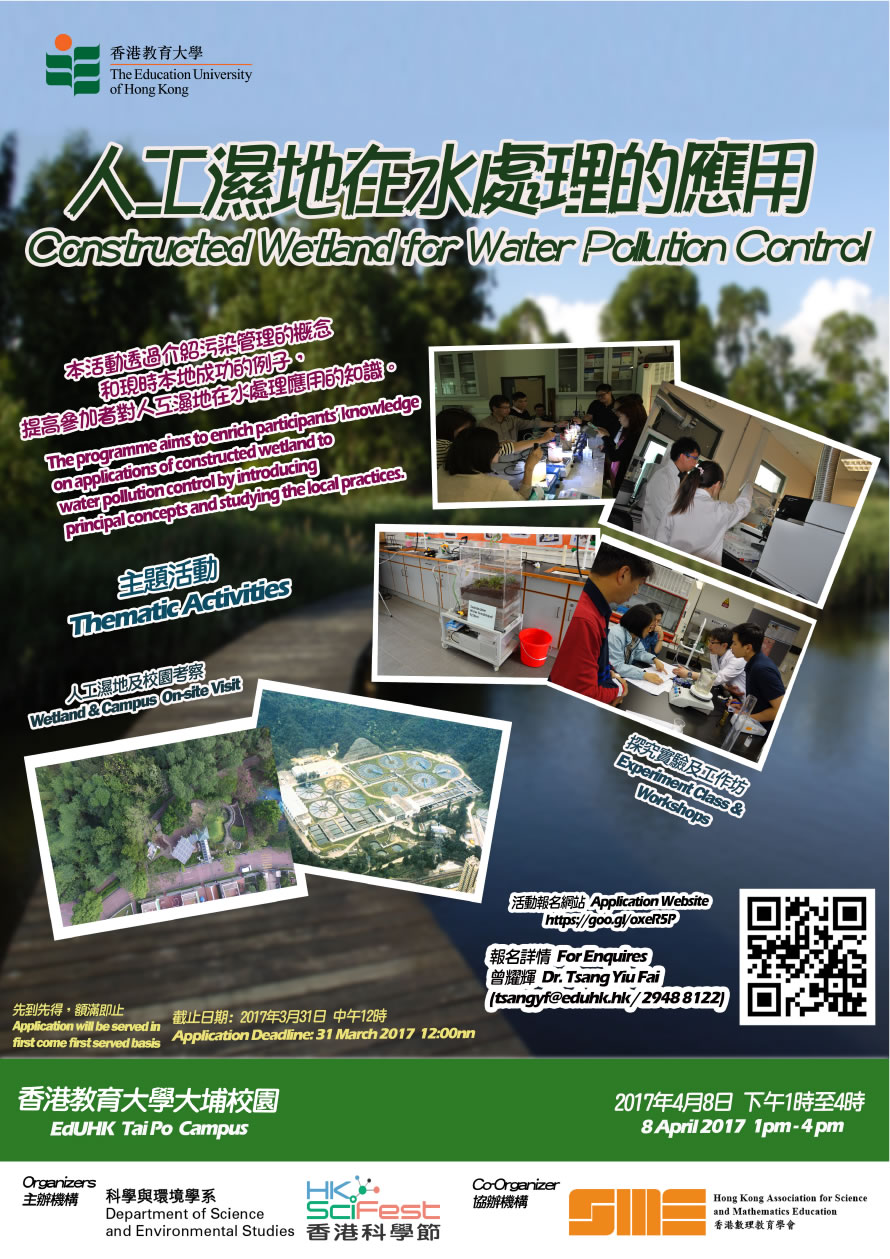Science and Environmental Education

Science and environmental education comprise teaching and learning of science and environmentally related subject contents, processes and attitudes. Our targets include primarily pre-service and serving teachers as well as students that have an interest in this subject area. Contemporary science and environmental issues in our daily live offer excellent vehicles for acquiring knowledge, skills, and attitudes essential for developing future careers in these areas as well as nurturing responsible citizens with scientific and environmental literacy.
Science and environmental education are provided in various teacher education programmes at the undergraduate and postgraduate levels. Science Education and Education for Sustainability is a Specialized Area in the Doctor of Education programme, and Science and Environmental Studies is an Area of Focus in the Master of Education programme for nurturing leaders in science education. In the Postgraduate Diploma in Education programmes, science education is offered to equip student teachers with the essential curriculum knowledge and pedagogical skills for teaching Primary General Studies, Junior Secondary Science and Senior Secondary Sciences.
Science

The major and minor programmes and elective science courses offered by the Department embrace broad and balanced combinations of pure science disciplines (including Physics, Chemistry and Biology) as well as various integrated and interdisciplinary science areas such as astronomy, materials science, health science, technology, etc. In various teacher education programmes, science courses are offered as part of the Science minor and Science second major, while science contents are often incorporated into interdisciplinary courses such as Science, Technology and Society, and Natural World. In education programmes such as the Bachelor of Education (Honours) (Science), a variety of science-related courses are offered as a major, minor or elective courses. Science also features in the General Education domain of all undergraduate programmes.
Environmental Studies

Environmental Studies is an interdisciplinary field integrating science, technology, policy, sociology, economics, politics and law.
Our department has integrated the scientific and technological facets of Environmental Studies into various undergraduate and postgraduate programmes, environmental-related courses and general education electives. This is considered necessary as the subjects of General Studies in the primary curriculum has a strong emphasis on sustainable development and human-environment interactions. Through studying these modules, participants can attain a foundational understanding of environmental studies. Also included in these courses are essential pedagogical skills for conducting effective education for sustainable development (ESD) in schools.
Since 2010/11, Environmental Studies has formed a major component of the Bachelor of Social Science degree in Global and Environmental Studies programme under the auspices of the Faculty of Liberal Arts and Social Sciences. In 2014, the Department began to offer the Master of Arts in Education for Sustainability. With the launch of these programmes focussing on Environmental Studies, the Department members established Centre for Education in Environmental Sustainability in 2013 to further develop environmental education and sustainability studies in Hong Kong.
General Studies

General Studies is both a major and minor subject in BEd (Primary) and PGDE (Primary) programmes. It traverses the key learning areas of science education, technology education, as well as personal, social and health education. This subject aims to develop student-teachers’ competence in promoting primary students’ interdisciplinary knowledge and generic skills for life-wide and life-long learning fostering positive personal and social values and attitudes and enhancing their ability to learn through inquiry, project learning and service learning. General Studies is an important vehicle for civic, moral and sex education in primary schools. Taught as an integrated subject, General Studies focuses on the development of both disciplinary and interdisciplinary knowledge, generic skills (e.g., problem-solving, critical thinking, creativity, study skills, and communication, etc.) and discipline-related skills (e.g., skills for scientific inquiry and value education) that are essential for learning in the information era and for inquiry into the environment.
STEM

STEM refers to the four disciplines, namely Science, Technology, Engineering and Mathematics, not only as separate disciplines but also as an integrated whole, with emphasis on their interconnections. We envision a dual mission for STEM educators to equip our future citizenry with a level of STEM literacy essential for living in a society that relies increasingly on the use of technology to solve daily problems. They must also prepare a greater proportion of our younger generation to pursue further study in STEM disciplines or to enter STEM careers by helping them develop relevant STEM knowledge and skills. In 2019, the Department began to offer a Master of Arts in STEM Education to equip students with the essential STEM pedagogical content knowledge and skills that could help them to blend interdisciplinary approaches with conventional discipline-based learning approaches in the classroom.










